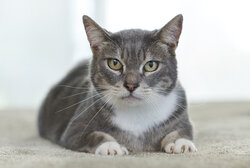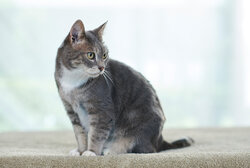Common allergies in cats – how you can help your feline friend
If your cat scratches its face or neck to the point where it loses fur or bleeds, this may be due to an allergy. Unfortunately, there is not just one type of allergy; cats can react to environmental allergens (atopic dermatitis), flea bites and food.
Our animonda specialist vet for animal nutrition and dietetics, Dr. vet med. Simone Radicke, shares some tips on how you can find out what is wrong with your cat and which treatment options can help.
In this animonda interview you will find out:
- what common allergies cats can develop
- what symptoms can point to an allergy
- how to deal with an environmental allergy in your cat
- what to do if your cat has a food allergy
- how a flea bite allergy can be treated

Common allergies in cats: Causes & symptoms
animonda: What are the most common allergies in cats?
Dr. vet med. Simone Radicke: Allergies that are common in cats are flea bite allergies, environmental allergies – also known as atopic dermatitis – and food allergies.
If your cat is suffering from atopic dermatitis (environmental allergy), it will react to allergens that are found in the environment: House dust, mites, mould spores and also pollen. Depending on what triggers the environmental allergy, the symptoms may only occur in spring or summer – as with an allergy to pollen. Or even all year round, for example if your cat is allergic to dust mites.
animonda: What symptoms will my cat have if it has an allergy?
Dr. vet med. Simone Radicke: The main symptom where you should always check whether your cat is suffering from an allergy is itching. Cats lick themselves and rub or scratch their faces, necks, paws and ears. Scratching can often lead to hair loss. If the cat scratches itself intensively, open wounds with or without crusts may develop. The skin may also react with swelling and changes in colour (redness). The cat may, however, also vomit and have diarrhoea.
How to treat your cat’s allergies
animonda: How is a specific allergy diagnosed in my cat?
Dr. vet med. Simone Radicke: Basically, an allergy is always a sign that the cat’s immune system reacts to a specific allergen.
Cats that have a flea bite allergy should be regularly checked for fleas. If the cat has a food allergy, it can only be diagnosed by means of an elimination diet (exclusion diet). If it does not respond to either, it is important to rule out any other ectoparasites. Then again, it may be highly likely that we are dealing with an allergy to environmental allergens. Only in this case will the vet carry out an allergy test on the skin. Any skin reactions that occur will be assessed after a maximum of 30 minutes.
In order to find out which allergen is causing your cat’s complaints, you should consult your vet.
animonda: How can my cat be treated for a flea saliva allergy?
Dr. vet med. Simone Radicke: Your cat will try to relieve the itchiness caused by the flea bites by licking, scratching or biting its fur and skin. This often results in inflammation or open wounds.
Your vet will recommend various products to relieve your cat’s symptoms and get rid of the fleas. First of all, the fleas have to be tackled, for example with a spot-on product, a medicine in liquid form. This is done by dripping the spot-on medication onto the skin on the back of the cat’s neck. It works quickly and kills the fleas.
As a next step, your vet will suggest suitable products to treat the open wounds. This will allow you to treat the injured areas of your cat's skin. Cats with a flea bite allergy should be thoroughly checked for fleas throughout their lives.
In addition to flea control on the cat itself, it is also important to deal with the cat’s living environment. This is because only a small proportion of the fleas are actually on the cat’s body. For this reason, it is also important to treat your home with the appropriate products. Here as well, the vet will be able to provide you with suitable recommendations.
animonda: As a cat owner, what can I do if my cat is suffering from an environmental allergy (atopic dermatitis)?
Dr. vet med. Simone Radicke: In the case of an environmental allergy, your vet will probably recommend tablets in the form of antihistamines. These are usually well tolerated and can also be administered over longer periods of time. As an alternative, desensitisation therapy can be an effective solution. Here, you inject your cat with the respective allergen – first on a weekly basis and then at intervals of four weeks.
animonda: How can my cat be treated if it has a food allergy?
Dr. vet med. Simone Radicke: If your vet suspects that your cat has a food allergy, they will recommend an exclusion diet. Your pet’s food will then be changed in order to find out which protein triggers the allergy.
To do this, your cat’s current feeding regime has to be checked. Then a dietary food will be suggested that contains proteins to which the cat has had little or no previous exposure up to now. It is important that you only give your cat this special food and do not make any exceptions. Therefore, things like snacks are completely taboo during this period, because they could directly induce itching again. You will normally have to keep your cat on the exclusion diet for 8 to 12 weeks. Following this, a “provocation test” is conducted. Here, your cat is systematically fed with the suspected allergens. This is very important in order to be sure that you really have identified the triggering protein, so that you can permanently eliminate it from your cat’s diet.
![[Translate to English:] Katze bekommt Trockenfutter](/fileadmin/media/images/Magazin/katze/02-Katzengesundheit/haeufige-allergien-bei-katzen/katze-bekommt-futtern-magazin-haeufige-allergien-contentimage-560x375.jpg)
animonda: What do I have to keep in mind in everyday life with an allergic cat?
Dr. vet med. Simone Radicke: As soon as your vet has helped you to find out which allergen your cat is reacting to, you should ensure that it does not come into contact with the allergen again, and always observe whether any symptoms reappear. In case of a flea bite allergy, make sure that you regularly check your cat for fleas.
Ask your family, partner or other co-habitants to keep a close eye on your cat and, in the case of a food allergy, to only feed it with the food that it tolerates well.
You may also like this

Allergies in cats
Typical signs of allergies in cats

Food allergies in cats
In the case of a food allergy, a special food can help

Fleas in cats
An infestation of fleas must be treated thoroughly

When a cat keeps scratching itself
Possible causes if your cat keeps scratching itself
